19 books about Harris, Tina
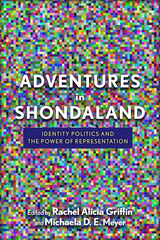
Adventures in Shondaland
Identity Politics and the Power of Representation
Griffin, Rachel Alicia
Rutgers University Press, 2018
Innovator Award for Edited Collection from the Central States Communication Association (CSCA)
Shonda Rhimes is one of the most powerful players in contemporary American network television. Beginning with her break-out hit series Grey’s Anatomy, she has successfully debuted Private Practice, Scandal, How to Get Away with Murder, The Catch, For The People, and Station 19. Rhimes’s work is attentive to identity politics, “post-” identity politics, power, and representation, addressing innumerable societal issues. Rhimes intentionally addresses these issues with diverse characters and story lines that center, for example, on interracial friendships and relationships, LGBTIQ relationships and parenting, the impact of disability on familial and work dynamics, and complex representations of womanhood. This volume serves as a means to theorize Rhimes’s contributions and influence by inspiring provocative conversations about television as a deeply politicized institution and exploring how Rhimes fits into the implications of twenty-first century television.
Shonda Rhimes is one of the most powerful players in contemporary American network television. Beginning with her break-out hit series Grey’s Anatomy, she has successfully debuted Private Practice, Scandal, How to Get Away with Murder, The Catch, For The People, and Station 19. Rhimes’s work is attentive to identity politics, “post-” identity politics, power, and representation, addressing innumerable societal issues. Rhimes intentionally addresses these issues with diverse characters and story lines that center, for example, on interracial friendships and relationships, LGBTIQ relationships and parenting, the impact of disability on familial and work dynamics, and complex representations of womanhood. This volume serves as a means to theorize Rhimes’s contributions and influence by inspiring provocative conversations about television as a deeply politicized institution and exploring how Rhimes fits into the implications of twenty-first century television.
[more]
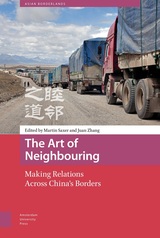
The Art of Neighbouring
Making Relations Across China's Borders
Edited by Martin Saxer and Juan Zhang
Amsterdam University Press, 2017
For the nations on its borders, the rapid rise of China represents an opportunity-but it also brings worry, especially in areas that have long been disputed territories of contact and exchange. This book gathers contributors from a range of disciplines to look at how people in those areas are actively engaging in making relationships across the border, and how those interactions are shaping life in the region-and in the process helping to reconfigure the cultural and political landscape of post-Cold War Asia.
[more]

Badass Feminist Politics
Exploring Radical Edges of Feminist Theory, Communication, and Activism
Sarah Jane Blithe
Rutgers University Press, 2022
In the late 2010s, the United States experienced a period of widespread silencing. Protests of unsafe drinking water have been met with tear gas; national park employees, environmentalists, and scientists have been ordered to stop communicating publicly. Advocates for gun control are silenced even as mass shootings continue. Expressed dissent to political power is labeled as “fake news.” DREAMers, Muslims, Trans military members, women, black bodies, the LGBTQI+ community, Latina/o/x communities, rape survivors, sex workers, and immigrants have all been systematically silenced. During this difficult time and despite such restrictions, advocates and allies persist and resist, forming dialogues that call to repel inequality in its many forms. Addressing the oppression of women of color, white women, women with (dis)abilities, and LBTQI+ individuals across cultures and contexts remains a central posit of feminist struggle and requires “a distinctly feminist politics of recognition.” However, as second wave debates about feminism have revealed, there is no single way to express a feminist politic. Rather, living feminist politics requires individual interpretation and struggle, collective discussion and disagreement, and recognizing difference among women as well as points of convergence in feminist struggle.
Badass Feminist Politics includes a diverse range of engaging feminist political projects to not only analyze the work being done on the ground but provide an overview for action that can be taken on by those seeking to engage in feminist activism in their own communities. Contributors included here are working for equality and equity and resisting violent, racist, homophobic, transphobic, xenophobic, and sexist language and action during this tension-filled political moment. Collectively, the book explores what it means to live and communicate feminist politics in everyday choices and actions, and how we can facilitate learning by analyzing these examples. Taking up current issues and new theoretical perspectives, the authors offer novel perspectives into what it means to live feminist politics. This book is a testament to resilience, resistance, communication, and forward thinking about what these themes all mean for new feminist agendas. Learning how to resist oppressive structures through words and actions is particularly important for students. Badass Feminist Politics features scholars from non-dominant groups taking up issues of marginalization and oppression, which can help people accomplish their social justice goals of inclusivity on the ground and in the classroom.
Badass Feminist Politics includes a diverse range of engaging feminist political projects to not only analyze the work being done on the ground but provide an overview for action that can be taken on by those seeking to engage in feminist activism in their own communities. Contributors included here are working for equality and equity and resisting violent, racist, homophobic, transphobic, xenophobic, and sexist language and action during this tension-filled political moment. Collectively, the book explores what it means to live and communicate feminist politics in everyday choices and actions, and how we can facilitate learning by analyzing these examples. Taking up current issues and new theoretical perspectives, the authors offer novel perspectives into what it means to live feminist politics. This book is a testament to resilience, resistance, communication, and forward thinking about what these themes all mean for new feminist agendas. Learning how to resist oppressive structures through words and actions is particularly important for students. Badass Feminist Politics features scholars from non-dominant groups taking up issues of marginalization and oppression, which can help people accomplish their social justice goals of inclusivity on the ground and in the classroom.
[more]
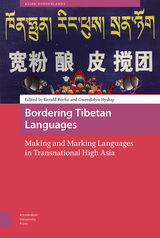
Bordering Tibetan Languages
Making and Marking Languages in Transnational High Asia
Gerald Roche
Amsterdam University Press, 2022
Bordering Tibetan Languages: Making and Marking Languages in Transnational High Asia examines the complex interactions between state, ethnic, and linguistic borders in the Himalaya. These case studies from Bhutan, China, India, and Nepal show how people in the Himalaya talk borders into existence, and also how those borders speak to them and their identities. These ‘talking borders’ exist in a world where state borders are contested, and which is being irrevocably transformed by rapid social and economic change. This book offers a new perspective on this dynamic region by centring language, and in doing so, also offers new ways of thinking about how borders and language influence each other.
[more]
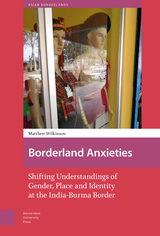
Borderland Anxieties
Shifting Understandings of Gender, Place and Identity at the India-Burma Border
Matthew Wilkinson
Amsterdam University Press, 2023
Borderland Anxieties explores the complex relationships between liberalization, gender and migration in Nagaland, a state in Northeast India that is emerging from decades of armed conflict. In the wake of Nagaland’s conflict, liberalization and an ‘opening up’ of the state to new connections and flows take place alongside ongoing militarization, nationalist insurgency, and political unrest. Nagaland’s complex peace-conflict continuum has encouraged a reordering of possibilities for men and for women in the state, but also, attempts to maintain fundamental social roles that are seen as defining an ethnic group, as foundations of identity, and for many as uncompromisable. In exploring the complex dynamics of peace, conflict, and tension in Nagaland, Borderland Anxieties offers a window to understanding how gender, politics and anxiety intersect in a borderland state experiencing rapid social, political, and economic changes.
+
[more]
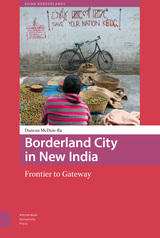
Borderland City in New India
Frontier to Gateway
Duncan McDuie-Ra
Amsterdam University Press, 2016
While India has been a popular subject of scholarly analysis in the past decade, the majority of that attention has been focused on its major cities. This volume instead explores contemporary urban life in a smaller city located in India's Northeast borderland at a time of dramatic change, showing how this city has been profoundly affected by armed conflict, militarism, displacement, interethnic tensions, and the expansion of neoliberal capitalism.
[more]
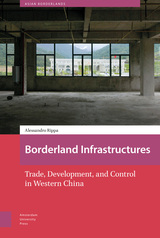
Borderland Infrastructures
Trade, Development, and Control in Western China
Alessandro Rippa
Amsterdam University Press, 2020
Across the Chinese borderlands, investments in large-scale transnational infrastructure such as roads and special economic zones have increased exponentially over the past two decades. Based on long-term ethnographic research, Borderland Infrastructures addresses a major contradiction at the heart of this fast-paced development: small-scale traders have lost their historic strategic advantages under the growth of massive Chinese state investment and are now struggling to keep their businesses afloat. Concurrently, local ethnic minorities have become the target of radical resettlement projects, securitization, and tourism initiatives, and have in many cases grown increasingly dependent on state subsidies. At the juncture of anthropological explorations of the state, border studies, and research on transnational trade and infrastructure development, Borderland Infrastructures provides new analytical tools to understand how state power is experienced, mediated, and enacted in Xinjiang and Yunnan. In the process, Rippa offers a rich and nuanced ethnography of life across China’s peripheries.
[more]
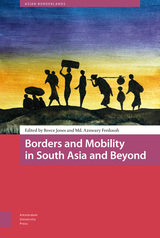
Borders and Mobility in South Asia and Beyond
Edited by Reece Jones and Md. Azmeary Ferdoush
Amsterdam University Press, 2018
The world is experiencing one of the largest movements of people in history with 65 million people displaced by conflict in 2015, the majority of which were from Asia. This book brings a deep engagement with individuals whose lives are shaped by encounters with borders by telling the stories of a poor Bangladeshi women who regularly crosses the India border to visit family, of Muslims from India living in Gulf countries for work, and the harrowing journey of a young Afghan man as he sets off on foot to Germany. The international and interdisciplinary work in this book contributes to this moment by analyzing how borders are experienced by migrants and borderlanders in South Asia, how mobility and diaspora are engaged in literature and media, and how the lives of migrants are transformed during their journey to new homes in South Asia, the Middle East, North America, and Europe.
[more]
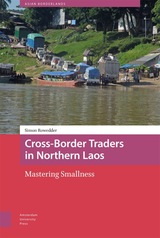
Cross-Border Traders in Northern Laos
Mastering Smallness
Simon Rowedder
Amsterdam University Press, 2022
Northern Laos has become a prominent spot in large-scale, top-down mappings and studies of neoliberal globalisation and infrastructural development linking Thailand and China, and markets further beyond. Yet in the common narrative, in which Laos appears as a weak victim helplessly exposed to its larger neighbours, attention is seldom paid to local voices. This book fills this gap. Building on long-term multi-sited fieldwork, it accompanies northern Lao cross-border traders closely in their transnational worlds of mobilities, social relations, economic experimentation and aspiration. Cross-Border Traders in Northern Laos: Mastering Smallness demonstrates that these traders’ indispensable but often invisible role in the everyday workings of the China-Laos-Thailand borderland economy relies on their rhetoric and practices of ‘smallness’—of framing their transnational trade activities in a self-deprecating manner and stressing their economic inferiority. Decoding their discursive surface of insignificance, this ethnography of ‘smallness’ foregrounds remarkable transnational social and economic skills that are mostly invisible in Sino-Southeast Asian borderland scholarship.
[more]
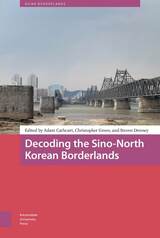
Decoding the Sino-North Korean Borderlands
Adam Cathcart
Amsterdam University Press, 2020
In the past decade, the Chinese-North Korean border region has undergone a gradual transformation into a site of intensified cooperation, competition, and intrigue. These changes have prompted a significant volume of critical scholarship and media commentary across multiple languages and disciplines. Drawing on existing studies and new data, this volume brings much of this literature into concert by pulling together a wide range of insight on the region's economics, security, social cohesion, and information flows. Drawing from multilingual sources and transnational scholarship, the volume is enhanced by the extensive fieldwork undertaken by the editors and contributors in their quest to decode the borderland. In doing so, the volume emphasizes the link between theory, methodology, and practice in the field of Area Studies and social science more broadly.
[more]
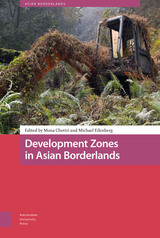
Development Zones in Asian Borderlands
Mona Chettri
Amsterdam University Press, 2021
Development Zones in Asian Borderlands maps the nexus between global capital flows, national economic policies, infrastructural connectivity, migration, and aspirations for modernity in the borderlands of South and South-East Asia. In doing so, it demonstrates how these are transforming borderlands from remote, peripheral backyards to front-yards of economic development and state-building. Development zones encapsulate the networks, institutions, politics and processes specific to enclave development, and offer a new analytical framework for thinking about borderlands; namely, as sites of capital accumulation, territorialisation and socio-spatial changes.
[more]
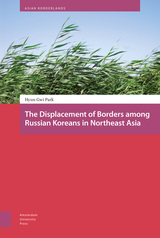
The Displacement of Borders among Russian Koreans in Northeast Asia
Hyun Gwi Park
Amsterdam University Press, 2017
Since the nineteenth century, ethnic Koreans have represented a small yet significant portion of the population of the Russian Far East, but until now, the phenomenon has been largely understudied. Based on extensive historical and ethnographic research, this is the first book in English to chart the contemporary social life of Koreans in the complex borderland region. Dispelling the commonly held notion that Koreans were completely removed from the region during the country's attempt to 'cleanse' its borders in 1937, Hyun Gwi Park reveals timely new insights into the historical and current experiences of Koreans living along the Eurasian frontier.
[more]
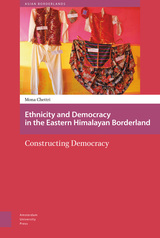
Ethnicity and Democracy in the Eastern Himalayan Borderland
Constructing Democracy
Mona Chettri
Amsterdam University Press, 2017
This book presents a close look at the growth, success, and proliferation of ethnic politics on the peripheries of modern South Asia, built around a case study of the Nepal ethnic group that lives in the borderlands of Sikkim, Darjeeling, and east Nepal. Grounded in historical and ethnographic research, it critically examines the relationship between culture and politics in a geographical space that is home to a diverse range of ethnic identities, showing how new modes of political representation, cultural activism, and everyday politics have emerged from the region.
[more]
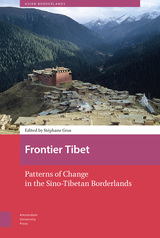
Frontier Tibet
Patterns of Change in the Sino-Tibetan Borderlands
Willem van Schendel
Amsterdam University Press, 2020
Frontier Tibet: Patterns of Change in the Sino-Tibetan Borderlands addresses a historical sequence that sealed the future of the Sino-Tibetan borderlands. It considers how starting in the late nineteenth century imperial formations and emerging nation-states developed competing schemes of integration and debated about where the border between China and Tibet should be. It also ponders the ways in which this border is internalised today, creating within the People’s Republic of China a space that retains some characteristics of a historical frontier. The region of eastern Tibet called Kham, the focus of this volume, is a productive lens through which processes of place-making and frontier dynamics can be analysed. Using historical records and ethnography, the authors challenge purely externalist approaches to convey a sense of Kham’s own centrality and the agency of the actors involved. They contribute to a history from below that is relevant to the history of China and Tibet, and of comparative value for borderland studies.
[more]
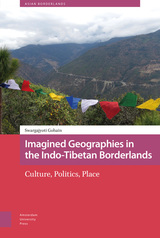
Imagined Geographies in the Indo-Tibetan Borderlands
Culture, Politics, Place
Swargajyoti Gohain
Amsterdam University Press, 2020
This book is an ethnography of culture and politics in Monyul, a Tibetan Buddhist cultural region in west Arunachal Pradesh, Northeast India. For nearly three centuries, Monyul was part of the Tibetan state, and the Monpas, as the communities inhabiting this region are collectively known, participated in trans-Himalayan trade and pilgrimage. Following the colonial demarcation of the Indo-Tibetan boundary in 1914, the fall of the Tibetan state in 1951, and the India-China boundary war in 1962, Monyul was gradually integrated into India and the Monpas became one of the Scheduled Tribes of India. In 2003, the Monpas began a demand for autonomy, under the leadership of Tsona Gontse Rinpoche. This book examines the narratives and politics of the autonomy movement regarding language, place-names, and trans-border kinship, against the backdrop of the India-China border dispute. It explores how the Monpas negotiate multiple identities to imagine new forms of community that transcend regional and national borders.
[more]
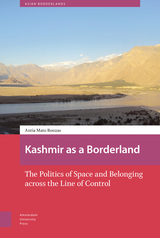
Kashmir as a Borderland
The Politics of Space and Belonging across the Line of Control
Antía Mato Bouzas
Amsterdam University Press, 2019
*Kashmir as a Borderland: The Politics of Space and Belonging across the Line of Control* examines the Kashmir dispute from both sides of the Line of Control (LoC) and within the theoretical frame of border studies. It draws on the experiences of those living in these territories such as divided families, traders, cultural and social activists. Kashmir is a borderland, that is, a context for spatial transformations, where the resulting interactions can be read as a process of ‘becoming’ rather than of ‘being’. The analysis of this borderland shows how the conflict is manifested in territory, in specific locations with a geopolitical meaning, evidencing the discrepancy between ‘representation’ and the ‘living’. The author puts forward the concept of belonging as a useful category for investigating more inclusive political spaces.
[more]
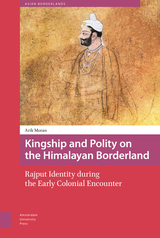
Kingship and Polity on the Himalayan Borderland
Rajput Identity during the Early Colonial Encounter
Arik Moran
Amsterdam University Press, 2019
Kingship and Polity on the Himalayan Borderland explores the modern transformation of state and society in the Indian Himalaya. Centred on three Rajput led-kingdoms during the transition to British rule (c. 1790-1840) and their interconnected histories, it demonstrates how border making practices engendered a modern reading of ‘tradition’ that informs communal identities to this day. Countering the common depiction of these states as all-male, caste-exclusive entities, it reveals the strong familial base of Rajput polity, wherein women — and regent queens in particular — played a key role alongside numerous non-Rajput groups. Drawing on rich archival records, rarely examined local histories, and nearly two decades of ethnographic research, it offers an alternative to the popular and scholarly discourses that developed with the rise of colonial knowledge. The analysis exposes the cardinal contribution of borderland spaces to the fabrication of group identities. This book will interest historians and anthropologists of South Asia and of the Himalaya, as well as scholars working on postcolonialism, gender, and historiography.
[more]
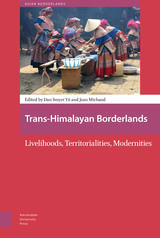
Trans-Himalayan Borderlands
Livelihoods, Territorialities, Modernities
Edited by Dan Smyer Yü and Jean Michaud
Amsterdam University Press, 2017
The societies in the Himalayan borderlands have undergone wide-ranging transformations, as the territorial reconfiguration of modern nation-states since the mid-twentieth century and the presently increasing trans-Himalayan movements of people, goods and capital, reshape the livelihoods of communities, pulling them into global trends of modernisation and regional discourses of national belonging.This book explores the changes to native senses of place, the conception of border - simultaneously as limitations and opportunities - and what the authors call "affective boundaries," "livelihood reconstruction," and "trans-Himalayan modernities." It addresses changing social, political, and environmental conditions that acknowledge growing external connectivity even as it emphasises the importance of place.
[more]

Trust and Mistrust in the Economies of the China-Russia Borderlands
Edited by Caroline Humphrey
Amsterdam University Press, 2018
The first English-language book to focus on northeast Sino-Russian border economies, Trust and Mistrust in the Economies of theChina-Russia Borderlands examines how trans-border economies function in practice. The authors offer an anthropological understanding of trust in juxtaposition to the economy and the state. They argue that the history of suspicion and the securitisedcharacter of the Sino-Russian border mean that trust is at a premium. The chapters show how diverse kinds of cross-border businessmanage to operate, often across great distances, despite widespread mistrust.
[more]
READERS
Browse our collection.
PUBLISHERS
See BiblioVault's publisher services.
STUDENT SERVICES
Files for college accessibility offices.
UChicago Accessibility Resources
home | accessibility | search | about | contact us
BiblioVault ® 2001 - 2024
The University of Chicago Press









